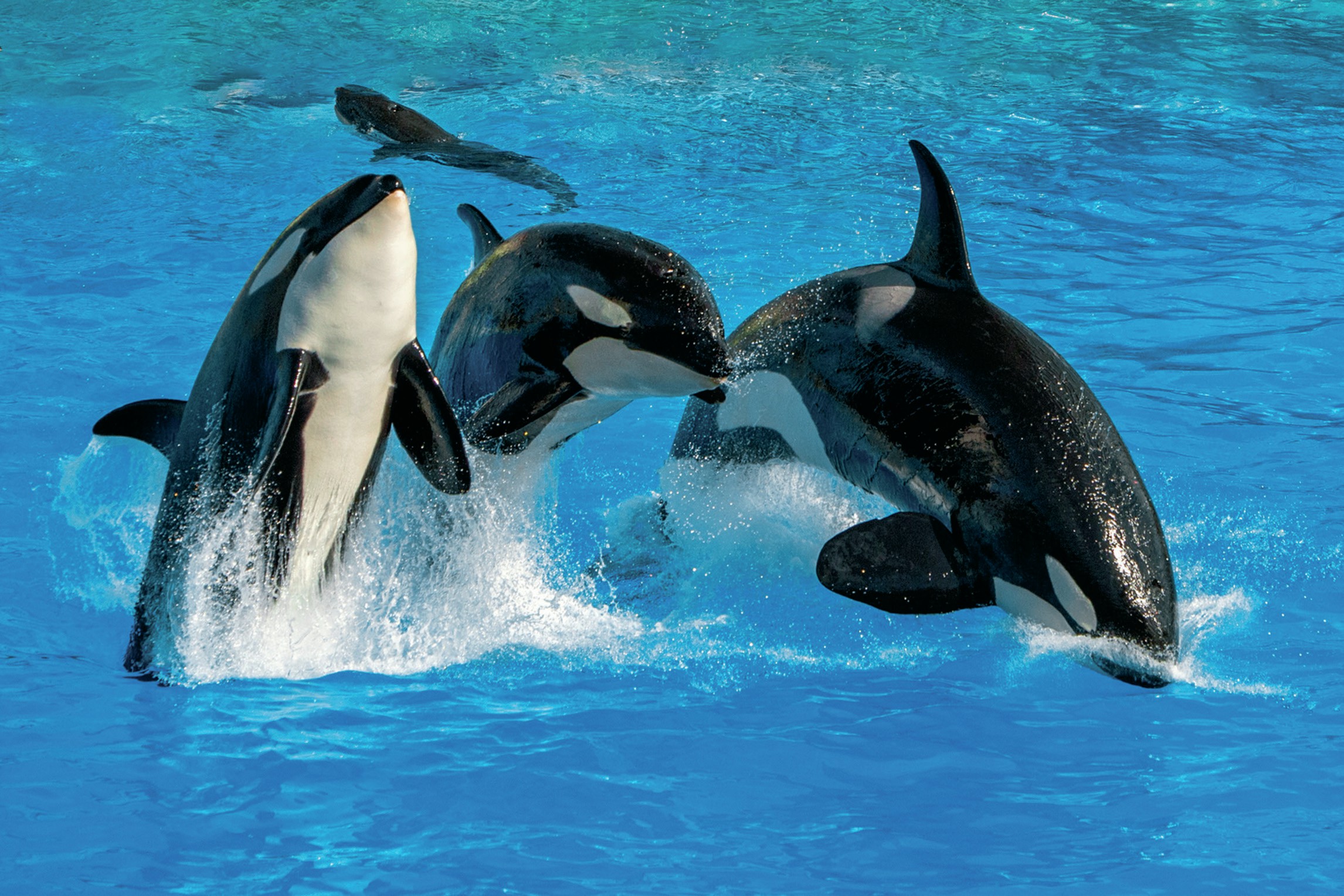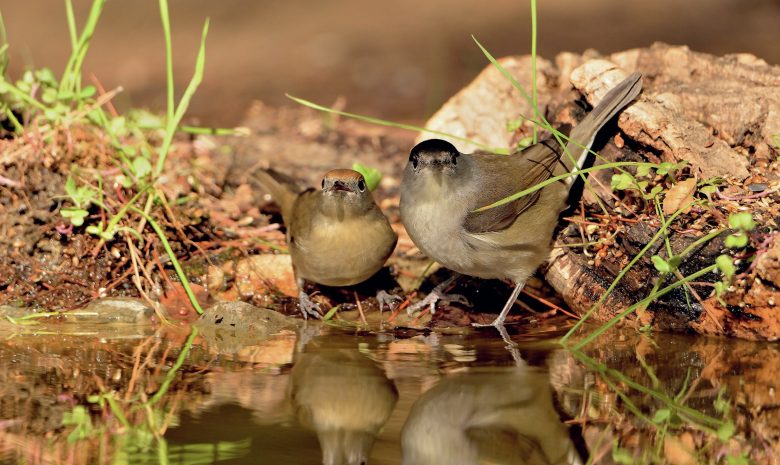Dominion or domination Are humans helping the natural world?
Environmental ethics is at the forefront of contemporary ethical thinking and is an important topic for study at AS and A-level. Edgar Parish explores the troubling question of how far humans genuinely help the natural world

Edexcel: 9RS0/02 Religion and Ethics
Environmental ethics is an area of ethical study that focuses on the relationship between humans and the natural world and the extent to which we should adapt our own behaviour in order to protect and conserve the natural world and everything in it. Common areas of concern include deforestation, pollution, mining for natural resources, minerals and fuels, the destruction of natural habitats, waste management, and — of particular interest to this article — speciesism and the exploitation of nonhuman animals in captivity.
Even though environmental ethics is a relatively new discipline in moral philosophy, we are still able to appeal to biblical texts and a wide range of ethical positions. Primitive culture always believed nature to be controlled by powerful spirits, who were appeased through sacrifice. Eastern philosophies taught that the laws of karma were played out in the natural world, so that natural disasters are a result of a build-up of bad karma in previous and present lives. Western attitudes were typically Judaeo-Christian, based on the belief that nature is a living force, created and controlled by God, and used by God to punish or reward humanity, which has responsibility to share in God’s creative work by maintaining the natural order. This continues to be expressed most commonly through the concept of stewardship.
Dominion
The most traditional approach to stewardship is the notion of dominion. Positively, this highlights the responsibility humans are given at creation to ‘Fill the earth and subdue it’ (Genesis 1:26). Humanity is made:
‘…in our image, in our likeness, so that they may rule over the fish in the sea and the birds in the sky, over the livestock and all the wild animals and over all the creatures that move along the ground.’
Dominion expresses a clear idea that humanity is superior to the rest of the created order and with that comes both privilege (rulership) and responsibility (to ensure that it will yield the good things that God intended it to provide for the benefit of the whole of creation). Although the concepts of dominion and stewardship go hand in hand, interpreting how they work out in practice is not without controversy. Although stewardship involves control (as a financial steward has responsibility to control how money is spent), thinkers are divided over whether that control should extend to domination — a term that is almost synonymous but carries with it a stronger sense of authority to control and manipulate.
Domination is clearly anthropocentric — care for the environment is carried out entirely for the benefit of humans and what they can gain from it and the environment is valued for its instrumental worth alone. Peter Singer observes:
‘According to the dominant Western tradition, the natural world exists for the benefit of human beings. God does not care how we treat it. Human beings are the only morally important members of this world. Nature itself has no intrinsic value… . Harsh as this tradition is, it does not rule out concern for the preservation of nature, as long as that concern can be related to human well-being.’
Singer 2011
Dominion, however, allows for both anthropocentric and theocentric interpretations — nature reflects God’s nature and worth, and humans exercise dominion because he has commanded them to do so. The intrinsic value of the environment may be recognised more readily, but it is still within the context of what it can do for humanity in the latter’s role as God’s regent on earth.
Creation
Genesis 1 makes clear that God places high value on creation — each act of creation is ‘good’, as it should be. At the end of the sixth day God evaluates all that he has made as ‘very good’. Ultimately, it is perfect — a harmonious, self-supporting system in which the role of humanity is clearly defined. In the second account of creation humanity is given the responsibility of naming the non-human animals: ‘(God) brought them to the man to see what he would name them, and whatever the man called each living creature, that was its name’ (Genesis 2:19). The act of naming stresses the authority and responsibility that the man has over his nonhuman counterparts, as a parent has authority and responsibility to name their child.
Thus the natural order is perceived from the beginning as instrumentally good — providing everything that is necessary for survival for both human and non-human animals: ‘I give you every seed-bearing plant on the face of the whole earth and every tree that has fruit with seed in it. They will be yours for food’ (Genesis 1:29). But it is intrinsically good since it reflects the perfect nature of its creator and glorifies his creative work. This is a major theme in the Psalms:
‘Praise him, you highest heavens and you waters above the skies. Let them praise the name of the Lord for at his command they were created.’
Psalm 148:4–5
‘The heavens declare the glory of God; the skies proclaim the work of his hands.’
Psalm 19:1
So interlinked is creation with its creator that it can even be described as participating in God’s work of judgement, as Micah 6:1–2 proclaims:
‘Stand up, plead my case before the mountains; let the hills hear what you have to say. ‘Hear, you mountains, the Lord’s accusation; listen, you everlasting foundations of the earth. For the Lord has a case against his people; he is lodging a charge against Israel.’
Furthermore, God’s concern for his creation endures — ‘Look at the birds of the air: they do not sow or reap or store away in bards, and yet your heavenly Father feeds them’ (Matthew 6:26) — and his plans for it are eternal: ‘As long as the earth endures, seedtime and harvest, cold and heat, summer and winter, day and night will never cease’ (Genesis 8:22). Francis of Assisi (1182–1226) believed that God communicates with humankind through the natural world and that it was a sin to destroy it. He maintained that all creatures, not just humans, have the capacity to praise and worship God as part of the same intrinsically good creation which must be treated with the same kindness and respect: ‘If you have men who will exclude any of God’s creatures from the shelter of compassion and pity, you will have men who will deal likewise with their fellow men’ (see, for example, www.tinyurl.com/zevjopw).
NATURAL ORDER IS PERCEIVED FROM THE BEGINNING AS INSTRUMENTALLY GOOD — PROVIDING EVERYTHING THAT IS NECESSARY FOR SURVIVAL FOR BOTH HUMAN AND NON-HUMAN ANIMALS
The consequence of sin
However, this theocentric, intrinsic value placed on the natural order is not natural to many people in the modern world, even (possibly especially) to Christians. Dominion is less about responsible, compassionate care and more about making choices in the natural world that are of primary benefit to humanity. As Peter Singer observes, the command to ‘subdue’ the earth is taken in a worryingly literal manner, and the problems of caring for the natural world are in many ways the consequence of humanity’s own selfishness and greed.
AFTER THE FALL, STEWARDSHIP OF THE NATURAL ORDER WILL BECOME A CHORE RATHER THAN A DELIGHT, WITH NO GUARANTEE THAT IT WILL YIELD THE FRUITFUL HARVEST THAT WAS INTENDED AT CREATION.
From a biblical perspective, these problems are due to human sinfulness in the Garden of Eden. Humanity disobeyed God and ate from the tree of the knowledge of good and evil. God, being just, has to punish them for their sin, and as a consequence the natural order is painfully disrupted:
‘Cursed is the ground because of you; through painful toil you will eat food from it all the days of your life. It will produce thorns and thistles for you…’
Genesis 3:17–18
After the Fall, stewardship of the natural order will become a chore rather than a delight, with no guarantee that it will yield the fruitful harvest that was intended at creation. This is described vividly in Isaiah 24:4–5: ‘The earth dries up and withers… . The earth lies polluted under its inhabitants for they have transgressed laws… . Therefore a curse devours the earth, and its inhabitants suffer for their guilt…’ Human sinfulness does not lessen after the Fall and God’s decision to wipe out all living things in a great flood affects the natural order even further. Innocent non-human lives will now be lost because of human sinfulness: ‘I will wipe out these people I have created, and also the animals and the birds, because I am sorry that I made any of them’ (Genesis 6:7).
Humanity takes control
However, in a pre-historical act of conservation, God ensures that not everything will be destroyed. Noah is to continue the responsibility of stewardship, so poorly executed by the rest of humanity: ‘Take into the boat with you a male and a female of every kind of animal and bird, in order to keep them alive. Take along all kinds of food for you and for them’ (Genesis 6:19–21). Whether this mitigates in any way against God’s decision to wipe out all he has made, after the flood has receded things don’t look good for non-human animals:
‘God blessed Noah and his sons and said, ‘Have many children, so that your descendants will live all over the earth. All the animals, birds and fish will live in fear of you. They are all places under your power. Now you can eat them, as well as green plants; I give them all to you for food.’
Genesis 9:1 –3
For no obvious reason, the status quo ’ has shifted dramatically, and dominion is now undeniably domination. Clearly the biblical writers felt the need to explain why meat was a central part of the human diet and it comes down to this: God told humans it was okay.
So, while the sin of Adam and Eve brought a curse on the ground, the post-flood covenant confusingly permits humans to devastate the natural world even further. The tension between humans and the natural order becomes all-out conflict and dominion becomes domination over a natural world which is already ‘Seared with trade, bleared, smeared with toil’ (Gerard Manley Hopkins) and will become increasingly so as human civilisation develops. And yet, of all the created order, it is humanity that has both the rational and physical capacity to restore the natural order and the broken relationship between humanity, creation and God, and to ensure that the lifestyle individuals and communities adopt does not undermine it further.
Eschatological perspectives
Is this an impossible challenge? While for some, concern and care for the natural world is a pleasure and a privilege, for others it is less clear cut. Within some Christian traditions, care for the natural world anticipates the future Kingdom of God in which all will be restored to its pre-Fall perfection in harmony and peace. For others, the principle of agape offers a guide for stewardship, taking into account the needs of other humans but also loving the natural world for its own intrinsic nature.
However, some conservative evangelical Christians argue that concern for the natural world is not a Christian duty since the imminent rapture and end of time will render it irrelevant. God gave humans dominion over the natural world and its resources so that it could provide for humanity and there is no need to act to conserve those resources if the apocalypse is upon us. Bizarrely, perhaps, end time theology welcomes the destruction of the natural environment as a sign that the historical order is coming to an end.
‘When he opened the sixth seal, I looked, and behold, there was a great earthquake; and the sun became black as sackcloth, the full moon became like blood, and the stars of the sky fell to the earth as the fig tree sheds its winter fruit when shaken by a gale; the sky vanished like a scroll that is rolled up, and every mountain and island was removed from its place…’
Revelation 6:12– 14
The restoration of creation will happen only after these events have taken place and those who have rejected Christ have been despatched to hell, leaving those who were saved by their faith in Jesus to enjoy the new earth.
‘Then I saw a new heaven and a new earth, for the first heaven and the first earth had passed away, and there was no longer any sea. …There will be no more death or mourning or crying or pain, for the old order of things has passed away.’
Revelation 21:1 , 4
Humans and non-human animals
This perspective is difficult for some Christians and many secularists and people of other faiths who place respect and love for the natural order at the heart of their ethics, while the status of non-human animals in particular in Christian theology has not been high. Thomas Aquinas argued that non-human animals were without souls and therefore how they were treated did not matter; they existed only for the benefit of humankind and had no rights, hence humans had no responsibility for them. Only humanity had a place in the redemptive plan of God and animals were of no concern to him. Christianity has not entirely grown out of this perspective. Andrew Linzey observes: ‘The idea that the specifically animal creation should be the subject of honour and respect because it is created by God…remains largely vague and unfocussed’.
There are many instances worldwide that show just how ignorant humans are about non-human animal life and how far they are still prepared to use them for their own greedy purposes. Despite ever-increasing knowledge and understanding about animal intelligence, psychology, emotion, problem-solving abilities, rationality, intuitive awareness and capacity to connect and communicate at a deep level with humans and non-human animals, the majority of humans find it difficult to think of non-human animals as having the same status and rights as humans. Peter Singer calls this speciesism: ‘a prejudice or bias in favour of the interests of members of one’s own species and against those of members of other species.’
Opponents of speciesism argue that it is as morally unacceptable as sexism or racism, and assert that giving human beings greater rights than non-human animals is as arbitrary and wrong as giving white people greater rights than non-white people. Supporters of speciesism, however, argue that there is a morally relevant difference between human and non-human animals which justifies different treatment, but this position clearly puts up a significant barrier to solving the problems of the widespread and devastating abuse of non-human animals worldwide.
SOME CONSERVATIVE EVANGELICAL CHRISTIANS ARGUE THAT CONCERN FOR THE NATURAL WORLD IS NOT A CHRISTIAN DUTY SINCE THE IMMINENT RAPTURE AND END OF TIME WILL RENDER IT IRRELEVANT
The SeaWorld controversy
The documentary Blackfish (2013) charts the events surrounding the death of orca-trainer Dawn Brancheau in 2010 and exposes years of mistreatment of, and miseducation about, orcas and other marine animals in the name of commercial profitability and public relations. Orcas are highly intelligent, emotionally complex and physically powerful creatures, and yet marine parks still maintain programmes of captivity and breeding in the name of entertainment while systematically denying the testimony of experts, deceiving staff and guests, and ignoring best practice based on up-to-date knowledge and understanding of orcas.
Some former trainers have spoken out, including John Hargrove, who describes himself as an orca advocate, and whose book Beneath the Surface (2015) further exposed the SeaWorld company’s lack of responsible care for the animals in facilities. Interestingly, he refers to a conversation with a fellow trainer, a devout evangelical Christian, who had asked not to be named in the book. Hargrove asked her if she thought it was ethical for SeaWorld to profit from orcas in captivity: ‘Yes,’ she said, ‘because God gave us dominion over all the animals.’ Hargrove pushed his point: ‘When you see… those pools and the size of the facilities for the whales, in your heart do you truly think that is good enough for these animals, with everything we know about them and their needs?’ She said, ‘No.’
Certainly, problems of caring for the natural world are exacerbated by cases such as these where the differences between the natural world of freedom and the human world of captivity are draconian. Organisations such as SeaWorld are primarily driven by commercial interests, but even when this is not a motivating factor, caring for wild animals in captivity raises enormous ethical questions. There are currently more tigers in captivity in the USA than there are globally in the wild and big cat advocates such as Big Cat Rescue in Florida and WWF argue that poor regulations covering private ownership of exotic animals not only affects the health and safety of animals and humans in the community, but hinders genuine conservation efforts to protect and develop populations of tigers in the wild.
Similar issues surround the role of animals in zoos and circuses. The best zoos offer living conditions as close as possible to those in the wild and are committed to breeding programmes with the goal of releasing animals to the wild, but many people consider it arguable that there is a genuine educational value to be offered by zoos. It is surely better for children and adults to see animals in their natural habitats, even if financial limitations mean going to the Hebrides rather than Alaska. While the UK government has been under pressure from Parliament since 2011 to ban the use of wild animals in circuses, PETA (People for the Ethical Treatment of Animals) claims that as recently as 2015 no legislation had been passed to implement the ban. In the USA, although Ringling Brothers Circus reluctantly retired the last of its famous performing elephants in May 2016, it continues to fight animal rights campaigners in an increasingly expensive defence against abuse, and still uses lions, tigers and many smaller animals in its circus. PETA urges people to vote with their feet and to boycott circuses that use animals, and to attend animal-free circuses and animal-friendly forms of entertainment rather than perpetuate such abuse.
Identifying non-human animals as equals
Unfortunately, there is little in mainstream Christian teaching that helps animal advocates to stand up against these abuses and many animal defenders are unable to grasp that nonhuman animals have equal moral status with humans. While the majority of humans — religious believers and secular thinkers — fail to recognise the rights of non-human animals to be equal to those of humans there will continue to be considerable problems caring for the natural world.
Animal communicators such as Anna Breytenbach and Margrit Coates are part of a growing body of professionals who are concerned with raising awareness of the emotional, physical and psychological health and needs of non-human animals through intuitive communication.
Many remain sceptical about the possibility of inter-species communication. Until there is a widespread recognition that non-human animals have equal capacity for emotion and thought, problems of caring for them in natural and non-natural environments will remain.
THE BEST ZOOS OFFER LIVING CONDITIONS AS CLOSE AS POSSIBLE TO THOSE IN THE WILD AND ARE COMMITTED TO BREEDING PROGRAMMES WITH THE GOAL OF RELEASING ANIMALS TO THE WILD, BUT MANY PEOPLE CONSIDER IT ARGUABLE THAT THERE IS A GENUINE EDUCATIONAL VALUE TO BE OFFERED BY ZOOS.
Ecological movements
However, environmental ethics has developed a range of approaches to the broader natural world which suggest problems are being addressed. The deep ecology movement began with the publication of The Sand County Almanac by Aldo Leopold in 1949. Leopold rejected the religious anthropocentric position and argued that humans need to develop a new ethic in terms of the natural world. Arne Naess developed this idea in 1973, arguing in favour of both the intrinsic and instrumental value of the environment. He called this ecosophy, which promoted the belief that every living being has an equal right to flourish and that nature does not exist to serve humanity’s needs and wants. Naess maintained that Christian stewardship failed in this regard, proposing that in response humans should radically alter their approach to the natural world, abandoning economic goals, reducing population, being more self-reliant and conserving the diversity of species.
Eco-holism, associated with the work of James Lovelock’s Gaia hypothesis, also challenges the idea that humans are the most important species and focuses on seeing humans as part of the living whole of Gaia. Lovelock argued that all life forms are part of Gaia, which is a holistic, self-regulating living system — a being itself. There are echoes of the Design Argument in Lovelock’s hypothesis, as he argues that conditions that have favoured life have led to an intelligently organised living system which is not random and, interestingly, cannot be destroyed — although humans can be wiped out. However, as global temperatures have risen and the natural world faces increasing challenges, Lovelock has become more pessimistic about the planet’s capacity to survive.
Shallow ecology has adopted a more utilitarian approach, arguing that the natural world has instrumental value; it is a means to an end, in which conservation is important only in so far as it benefits humanity. Therefore, environmental damage can be justified if humans will ultimately benefit from it. This view can extend to embrace the idea that some species should be allowed to die out (perhaps even humans?) as part of the natural evolutionary process, and humans have no obligation to prevent natural extinctions. Television naturalist Chris Packham caused great consternation in 2009 when he claimed that pandas should be allowed to die out in the wild as they are not strong enough to survive unsupported. Money would be better spent on other more fruitful conservation projects, he claimed.
Where do we stand?
So, has Christian stewardship failed to provide a workable model for caring for the environment? Traditional understanding of stewardship has focused on dominion and leaned towards domination. The natural world has suffered greatly at human hands and it is only in relatively recent years that conservation projects have focused on maintaining the natural environment rather than forcing it to conform to human intentions. While most humans, religious and non-religious, recognise that cruelty towards nonhuman animals is wrong and inhumane, few would go so far as to acknowledge that they have equal rights. Deep ecology is seen as unrealistic, and the Gaia hypothesis has lost its way as environmental damage continues. If Christian stewardship is to make a difference, it needs to be applied quickly and with an acceptance that we are an integral part of the natural world which we share with all its inhabitants, and not the rulers of it.
ENVIRONMENTAL ETHICS HAS DEVELOPED A RANGE OF APPROACHES TO THE BROADER NATURAL WORLD WHICH SUGGEST PROBLEMS ARE BEING ADDRESSED
References
Hargrove, J. (2015) Beneath the Surface: Killer Whales, SeaWorld and the Truth Beyond Blackfish, Palgrave Macmillan.
Linzey, A. (2013) Why Animal Suffering Matters, Oxford University Press.
Singer, P. (2011) Practical Ethics, Cambridge University Press.





